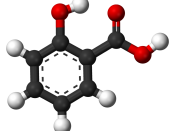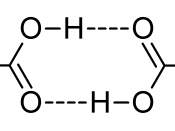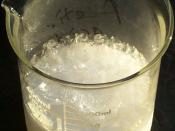1.SynopsisThe objective of this experiment is to learn to re-crystallise aspirin and to prepare aspirin.
To find out the purity of aspirin obtain by recrystallisation of prepared aspirin from reaction of salicylic acid with acetic anhydride. Purity can be determined by identify the melting point of aspirin. In this experiment, we get a range of 135.8ðC - 136.7ðC melting point of the synthesized aspirin. Comparing with the theoretical melting point, 140ðC, we can conclude that the purity we obtain was high.
Percentage yield was calculated out to find the experimental amount of aspirin formed by esterification of reactants. To get percentage yield, mass of salicylic acid is used to calculate out the theoretical mass of aspirin. While mass of aspirin obtain practically is found out by doing several steps of experiment - preparation and recrystallisation. Aspirin was first prepared by reacting salicylic acid with excess acetic anhydride. It was then filtered off to get crude product aspirin (relatively impure) and dissolved in ethanol for recrystallisation.
Pure aspirin was weighed after filtering and drying. With theoretical and practical value, percentage yield can be calculated. From this experiment, yield found to be 46.6%; this was indeed a fair result, according to Vogel's Textbook of Practical Organic Chemistry.
2. IntroductionAspirin, also known as acetylsalicylic acid, is a salicylate drug, often use as active component in pills that relieve pains (analgesic), reduce swelling (anti-inflammatory) and reduce fever (antipyretic). When ingested, aspirin remains intact in the acidic stomach, but in the basic medium of the upper intestinal tract, it hydrolyzes forming the salicylate and acetate ions. It even helps reduce the tendency of blood clot formation in people at high risk for developing blood clots, and as a means of preventing heart attacks, strokes, diabetic retinopathy and colon cancer. Aspirin also has a growing...


